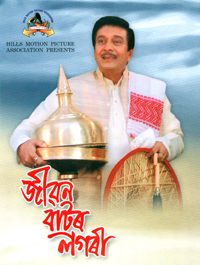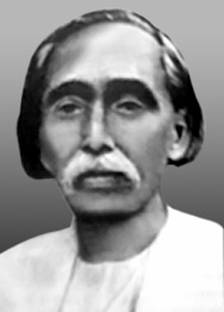
Padmanath Gohain Baruah was the first president of Asam Sahitya Sabha and a prominent name in the early part of modern Assamese literature. He was a novelist, poet, dramatist of excellence, analyst and a thought provoking writer. Considering his towering personality and profound knowledge, he is regarded as the "Pitamaha" in Assamese literary world. In recognition of his outstanding contributions to the Assamese literature and society, the British government gave him Raibahadur title, a rare honour conferred for the first time to an Assamese person. He was also the first literary pensioner of Assam.
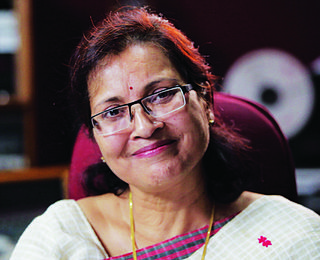
Moloya Goswami is an Indian actress who works in Assamese cinema. Her notable films inlcude Agnisnan, Firingoti and Calendar. In the 39th National Film Awards 1992, she won the Best Actress award for her performance in the Firingoti.

Jatin Bora is an Indian actor and director who has appeared in Assamese language films since 1989. He is also an actor and director in some mobile theatre groups of Assam, including Aabahan, Hengool, Ashirbaad, Bhagyadevi, Kohinoor, Itihas and Surjya.

Kopil Bora is an Assamese actor, anchor and All India Radio voice artist. He debuted in Bidyut Chakravarty's 2002 Assamese film Gun Gun Gane Gane and known for his performance in Mon (2002), Ahir Bhairav (2008), Jetuka Pator Dore (2011) and Dwaar (2013).
Suren Suror Putek is a 2005 Indian Assamese language comedy drama movie directed by Chandra Mudoi. The title role is played by Jatin Bora. This is the first Assamese film to highlight the art of magic and the talented magicians of the state.

Dimbeswar Neog (1899–1966), also known as the Indradhenu Poet, was a renowned writer, literati, critic, educator and poet of Assamese literature.
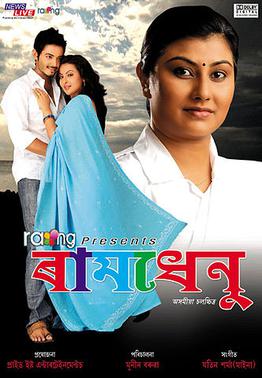
Raamdhenu is a 2011 Indian Assamese romantic drama film directed by veteran Munin Barua and produced by Pride East Entertainments Private Limited. It stars an ensemble cast of Jatin Bora, Prastuti Porasor, Tapan Das, Utpal Das and Nishita Goswami in the lead roles. The film was released in 24 cinema halls across Assam on 4 February 2011. The music is composed by Jatin Sharma.
Burhi Aair Sadhu or Burhi Aai'r Xaadhu is a collection of stories or folklore, that have been compiled by famous Assamese author and poet Lakshminath Bezbaruah. It is one of the most popular texts in Assamese literature. This book was first published in October–November 1911. After the first publication 100 years have been passed and countless editions of the book have been published. This book is in now in the public domain as per copyright law of India.

Lakshmi Nandan Bora was an Indian novelist and short story writer in the Assamese language, known for over 60 books he has authored, including award winning novels, Patal Bhairavi and Kayakalpa. A recipient of Sahitya Academy Award and Saraswati Samman, Bora was honoured by the Government of India in 2015 with Padma Shri, the fourth highest Indian civilian award. He died on 3 June 2021 from complications caused by COVID-19.
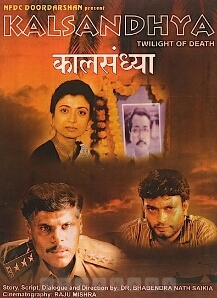
Kaal Sandhya is a 1997 Indian Hindi crime drama film dwelling on militancy in Assam, directed by Bhabendra Nath Saikia. The film deals with the theme of the impact of the insurgency on common people. It stars Jatin Bora, Ashish Vidyarthi, Debashree Roy, Nipon Goswami, Pranjal Saikia, Hemen Barman, Munin Barua and Mridula Baruah in the lead roles.
Hiya Diya Niya is a 2000 Indian Assamese romantic drama movie directed by Munin Barua and produced under Pooja Motion Pictures. The music was composed by Zubeen Garg. It was released on 25 February 2000. This film marked Assamese's first film to be shot outside India.

Baharul Islam is an Indian theater actor. An alumnus of the National School of Drama, which he had joined in 1987 Baharul has acted in more than 80 plays, designed and directed 30 plays for his theater troupe Seagull. He is one of the busiest theatre artists in Assam. He is also a film actor who works in Assamese and Hindi films.
Roopkar was the first Assamese language, tabloid-sized magazine about Assamese cinema, theater and culture. Established in 1974, the magazine was founded and edited by journalist and writer Pabitra Kumar Deka. Advisers of the magazine were singer & composer Bhupen Hazarika and writer Nirode Choudhury.
Aikyatan is a progressive drama group based in Guwahati in Assam founded by humor writer and film critic Pabitra Kumar Deka, historian and former principal of Cotton College Udayaditya Bharali, writer Anil Kumar Deka, noted editor of Assamese daily Asomiya Pratidin Nitya Bora and others in 1976. It has produced many memorable plays like Janani, Surjastak, Panchatantra, Sinhasan Khali, Hewers of Coal, Upahar, Night of January 16, and A Doll's House.
Poley Poley Urey Mon is a 2011 Indian Assamese language drama film directed by Timothy Das Hanche, produced by Phukan Konwar, Purnananda Gogoi and Beauty Baruah under the banner Hills Motion Pictures Association of Diphu. The casts of the movie are Nipon Goswami, Moloya Goswami, Barsha Rani Bishaya, Gayatri Mahanta, Ravi Sarma, Rimpi Das, Parineeta Borthakur, Tarun Arora, Mahika Sharma etc. Bollywood actor Raza Murad and former Assam CM Tarun Gogoi also performed a cameo in this movie.

Doordarshan Eti Jantra(English: Television a Machine) is a 2016 Indian Assamese language period comedy drama film directed by Rajesh Bhuyan and produced by Sanjiv Narain under the banner of AM Television. The story is based on National School of Drama's alumnus Himanshu Prasad Das's play Ekhon Gaonot Eta TV Asil. Director Rajesh Bhuyan is also the co screenplay writer along with Santanu Rowmuria. The original playwright Himanshu Prasad Das, and Santanu Rowmuria wrote the dialogues of the film. The film stars many of the renowned actors of Assamese film industry including Jatin Bora, Utpal Das, Prastuti Porasor and Moonmi Phukan in lead role. Released on 2 September 2016 in almost 50 theaters in Assam and Meghalaya (Shillong), the film has already become a superhit in Assam.
Purab ki Awaz is an Indian Historical drama film directed by Chandra Mudoi and produced by Loknath Deka. the film features Urmila Mahanta, Nipon Goswami, Debashis Borthakur, Rina Bora and others. this film release in All India on 10 March and will be releasing soon in Assam in August 2017.

Piyoli Phukan is a black & white Assamese language film directed by Phani Sarma, released in 1955. The film is based on the life and struggle of a historical character of Assam, Piyoli Phukan, son of Badan Borphukan, who revolted against British occupation. He was sentenced to death and hanged in 1830 at Jorhat. The film is produced by Gama Prasad Agarwalla under the banner of Rupjyoti Productions, Tezpur, Assam. Music is composed by Bhupen Hazarika. Piyoli Phukan is the first Assamese film, which got national recognition. The film was honoured by the Certificate of Merit in State Awards, 1956.
Tumi Mur Mathu Mur is a 2000 Indian Assamese romantic-drama film directed by Zubeen Garg in his directorial debut and produced by Debo Borkotoky. It was released on 25 February 2000 opposite Munin Barua's romantic film Hiya Diya Niya.
